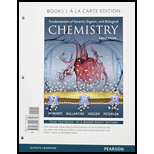
(a)
Interpretation:
Three possible structures of given
Concept Introduction:
Line (skeletal) structure: In organic compounds, the series of atoms in the compound are bonded together which shown by drawing a line between them. End of line segment represents carbon.
Structural Description of Alkene: An alkene contains
(b)
Interpretation:
Three possible structures of given
Concept Introduction:
Line (skeletal) structure: In organic compounds, the series of atoms in the compound are bonded together which shown by drawing a line between them. End of line segment represents carbon.
Structural Description of Alkyne: The general formula of alkyne is
(c)
Interpretation:
Structure of given monosubstituted benzene has to be drawn.
Concept Introduction:
Line (skeletal) structure: In organic compounds, the series of atoms in the compound are bonded together which shown by drawing a line between them. End of line segment represents carbon.
Structural Description of monosubstituted benzene: Monosubstituted benzenes are named using ‘-benzene’ as the parent name. The position of one substituent can be located at any one carbon of the benzene ring.
(d)
Interpretation:
Three possible structures of given disubstituted benzene has to be drawn.
Concept Introduction:
Line (skeletal) structure: In organic compounds, the series of atoms in the compound are bonded together which shown by drawing a line between them. End of line segment represents carbon.
Structural Description of Disubstituted benzene: When benzene has more than one substituent, the position of those substituents is indicated by numbers as (1,2), (1,3), and (1,4) or by (1,2-disubstitued) as ortho(o-),(1,3-disubstitued) as meta(m-) or(1,4-disubstitued) as para(p-) in prefix.

Want to see the full answer?
Check out a sample textbook solution
Chapter 13 Solutions
Fundamentals of General, Organic, and Biological Chemistry, Books a la Carte Plus Mastering Chemistry with Pearson eText -- Access Card Package (8th Edition)
- Calculate pH of a solution prepared by dissolving 1.60g of sodium acetate, in 88.5 mL of 0.10 M acetic acid. Assume the volume change upon dissolving the sodium acetate is negligible. Ka is 1.75 x 10^-5arrow_forwardShow a mechanism that leads to the opening of the ring below under acid-catalyzed conditions. Give the correct Fischer projection for this sugar.arrow_forwardWhat is the stereochemical relationship between B & C?arrow_forward
- Don't use ai or any chat gpt will dislike okk just use accurate information okkk okkk just solve full accurate. don't use guidelines okk just did it accurate 100% sure experts solve it correct complete solutions okkk follow all instructions requirements okkkarrow_forwardhow would you make this plot in excel?arrow_forwardwhat is the productarrow_forward
- Balance the following equation and list of coefficients in order from left to right. SF4+H2O+—-> H2SO3+HFarrow_forwardProblem 15 of 15 Submit Using the following reaction data points, construct Lineweaver-Burk plots for an enzyme with and without an inhibitor by dragging the points to their relevant coordinates on the graph and drawing a line of best fit. Using the information from this plot, determine the type of inhibitor present. 1 mM-1 1 s mM -1 [S]' V' with 10 μg per 20 54 10 36 20 5 27 2.5 23 1.25 20 Answer: |||arrow_forward12:33 CO Problem 4 of 15 4G 54% Done On the following Lineweaver-Burk -1 plot, identify the by dragging the Km point to the appropriate value. 1/V 40 35- 30- 25 20 15 10- T Км -15 10 -5 0 5 ||| 10 15 №20 25 25 30 1/[S] Г powered by desmosarrow_forward
 Anatomy & PhysiologyBiologyISBN:9781938168130Author:Kelly A. Young, James A. Wise, Peter DeSaix, Dean H. Kruse, Brandon Poe, Eddie Johnson, Jody E. Johnson, Oksana Korol, J. Gordon Betts, Mark WomblePublisher:OpenStax College
Anatomy & PhysiologyBiologyISBN:9781938168130Author:Kelly A. Young, James A. Wise, Peter DeSaix, Dean H. Kruse, Brandon Poe, Eddie Johnson, Jody E. Johnson, Oksana Korol, J. Gordon Betts, Mark WomblePublisher:OpenStax College Biology (MindTap Course List)BiologyISBN:9781337392938Author:Eldra Solomon, Charles Martin, Diana W. Martin, Linda R. BergPublisher:Cengage Learning
Biology (MindTap Course List)BiologyISBN:9781337392938Author:Eldra Solomon, Charles Martin, Diana W. Martin, Linda R. BergPublisher:Cengage Learning Biology 2eBiologyISBN:9781947172517Author:Matthew Douglas, Jung Choi, Mary Ann ClarkPublisher:OpenStax
Biology 2eBiologyISBN:9781947172517Author:Matthew Douglas, Jung Choi, Mary Ann ClarkPublisher:OpenStax





